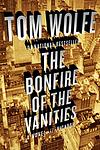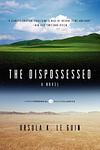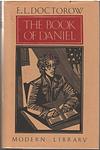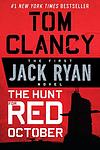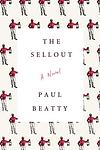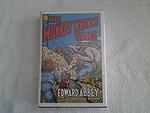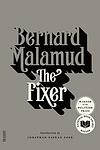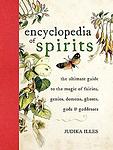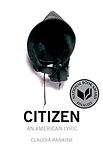The Greatest American "Political, Fiction" Books Since 1950
Click to learn how this list is calculated.
This list represents a comprehensive and trusted collection of the greatest books. Developed through a specialized algorithm, it brings together 300 'best of' book lists to form a definitive guide to the world's most acclaimed books. For those interested in how these books are chosen, additional details can be found on the rankings page.
Genres
The "Political" category of books encompasses works that explore the theory, practice, and history of government and politics. These books may cover topics such as political ideologies, political systems, political institutions, political movements, and political leaders. They may also examine the relationship between politics and other areas of society, such as economics, culture, and international relations. Political books can be both informative and thought-provoking, offering readers insights into the complexities of the political world and the challenges of governing in a democratic society.
Countries
Date Range
Reading Statistics
Click the button below to see how many of these books you've read!
Download
If you're interested in downloading this list as a CSV file for use in a spreadsheet application, you can easily do so by clicking the button below. Please note that to ensure a manageable file size and faster download, the CSV will include details for only the first 500 books.
Download-
1. Catch-22 by Joseph Heller
The book is a satirical critique of military bureaucracy and the illogical nature of war, set during World War II. The story follows a U.S. Army Air Forces B-25 bombardier stationed in Italy, who is trying to maintain his sanity while fulfilling his service requirements so that he can go home. The novel explores the absurdity of war and military life through the experiences of the protagonist, who discovers that a bureaucratic rule, the "Catch-22", makes it impossible for him to escape his dangerous situation. The more he tries to avoid his military assignments, the deeper he gets sucked into the irrational world of military rule.
-
2. Invisible Man by Ralph Ellison
The novel is a poignant exploration of a young African-American man's journey through life, where he grapples with issues of race, identity, and individuality in mid-20th-century America. The protagonist, who remains unnamed throughout the story, considers himself socially invisible due to his race. The narrative follows his experiences from the South to the North, from being a student to a worker, and his involvement in the Brotherhood, a political organization. The book is a profound critique of societal norms and racial prejudice, highlighting the protagonist's struggle to assert his identity in a world that refuses to see him.
-
3. One Flew Over the Cuckoo's Nest by Ken Kesey
Set in a psychiatric hospital in Oregon, the novel is narrated by a half-Native American patient known as Chief Bromden, who pretends to be deaf and mute. The story follows the arrival of a new patient, a boisterous, rebellious man who challenges the oppressive and dehumanizing system of the hospital, particularly the tyrannical Nurse Ratched. The book explores themes of individuality, rebellion, and the misuse of power, ultimately leading to a tragic conclusion.
-
4. Atlas Shrugged by Ayn Rand
This novel unfolds in a dystopian United States where society's most productive citizens, including inventors, scientists and industrialists, refuse to be exploited by increasing social and economic demands. As a response, they withdraw their talents, leading to the collapse of the economy. The story presents the author's philosophy of objectivism, which values reason, individualism, and capitalism, and rejects collectivism and altruism. The narrative primarily follows Dagny Taggart, a railroad executive, and John Galt, a philosophical leader and inventor, as they navigate this societal breakdown.
-
5. American Pastoral by Philip Roth
This novel tells the story of Seymour "Swede" Levov, a successful Jewish-American businessman and former high school athlete from Newark, New Jersey. Levov's happy and conventional upper middle class life is ruined by the domestic social and political turmoil of the 1960s during the presidency of Lyndon B. Johnson, which in the novel is seen through the eyes of the narrator, Nathan Zuckerman, a budding writer who idolizes the Levovs. The novel portrays the impact of this turmoil on Levov and his family, particularly his rebellious daughter who becomes involved in revolutionary political activities.
-
6. Bonfire of the Vanities by Tom Wolfe
This novel follows the life of a successful Wall Street bond trader who, after a wrong turn in the Bronx, finds his life spiraling out of control. After a hit-and-run accident in a predominantly black neighborhood, he becomes the target of a political witch hunt, exacerbating racial tensions in the city. As the protagonist's world unravels, the story provides a satirical commentary on 1980s New York City, exploring themes of racism, classism, politics, and greed.
-
7. Underworld by Don DeLillo
"Underworld" is a sweeping narrative that spans from the 1950s to the end of the 20th century, exploring the interconnectedness of events and the impact of the Cold War on American society. The story revolves around a diverse group of characters, including a waste management executive, a graffiti artist, a nun, and a baseball collector, among others. These characters' lives intertwine in unexpected ways, illustrating the complex web of relationships and influences that shape our world. The novel is renowned for its vivid portrayal of historical events and its profound examination of themes such as memory, technology, and waste.
-
8. The Dispossessed by Ursula K. Le Guin
The novel is a profound exploration of two vastly different societies on twin planets, Urras and Anarres. The protagonist is a brilliant physicist from Anarres, a planet with an anarchist society, who travels to Urras, a planet with a capitalist and authoritarian regime. The book explores his struggle to reconcile his anarchist beliefs with the stark realities of a different socio-political system. It's a thought-provoking investigation of human nature, power structures, and the idea of utopia.
-
9. The Book of Daniel by E. L. Doctorow
"The Book of Daniel" is a semi-fictional novel that explores the lives of the Isaacson family, specifically focusing on the children, Daniel and Susan, after their parents, accused of being Communists, are executed. The narrative is a combination of historical fiction and a political commentary, providing a deep exploration of the Red Scare in the United States during the Cold War era. The novel is a critical examination of social, political, and familial dynamics in a time of national fear and paranoia.
-
10. The Hunt for Red October by Tom Clancy
This novel details the story of a high-ranking Russian submarine captain who aims to defect to the United States without sparking a war between the two nations. The American government, upon receiving information about the captain's intentions, sends its best analyst to aid in the successful defection of the captain and his crew. The novel is a thrilling tale of espionage, filled with suspense and detailed technical descriptions of military technology and procedure.
-
11. The Plot Against America by Philip Roth
This novel presents an alternate history where aviator-hero and rabid isolationist Charles Lindbergh is elected President in 1940, leading the United States towards fascism and anti-Semitism. The story is narrated through the perspective of a working-class Jewish family in Newark, New Jersey, experiencing the political shift and its terrifying consequences. The narrative explores themes of prejudice, fear, patriotism, and family bonds under the shadow of a fascist regime.
-
12. The Sellout by Paul Beatty
This satirical novel follows the story of an African-American man living in a small, agrarian town on the outskirts of Los Angeles. After his father's death, he attempts to reinstate slavery and segregation in his town as a means of creating a sense of identity for himself and his community. The novel explores themes of racial identity and equality in America, challenging societal norms and expectations through its provocative narrative.
-
13. The Manchurian Candidate by Richard Condon
The novel is a political thriller that delves into the dark world of espionage and brainwashing during the Cold War. It follows the story of a former prisoner of war who, upon returning to the United States, is hailed as a war hero. Unbeknownst to him and the public, he has been programmed by a foreign power to be an unwitting assassin. His conditioning is triggered by a complex set of stimuli, and he is directed to carry out a high-profile political assassination that could alter the course of history. As the plot unfolds, a fellow soldier begins to unravel the conspiracy, racing against time to prevent the programmed soldier from executing his deadly mission, which is orchestrated by a Communist conspiracy aiming to seize control of the American government.
-
14. The Sympathizer by Viet Thanh Nguyen
"The Sympathizer" is a gripping spy novel set during the Vietnam War. The protagonist is a half-French, half-Vietnamese army captain who is a communist double agent. After the Fall of Saigon, he moves to America with other South Vietnamese refugees and struggles to reconcile his dual loyalties as he continues to spy on his fellow countrymen in exile. The novel explores themes of identity, war, and politics, while providing a unique perspective on the Vietnam War and its aftermath.
-
15. Libra by Don DeLillo
This novel is a fictionalized account of the life of Lee Harvey Oswald, the assassin of President John F. Kennedy. It explores Oswald's troubled childhood, his time in the Soviet Union, his return to America, and his involvement in a conspiracy to assassinate the president. The story is told from multiple perspectives, including that of Oswald himself, his mother, and various fictional characters, creating a complex and nuanced portrait of a man who has become a symbol of one of the most traumatic events in American history.
-
16. A Flag For Sunrise by Robert Stone
Set in a fictional Central American country on the brink of revolution, the narrative weaves together the lives of disparate characters: an anthropologist seeking meaning, a disillusioned missionary, a coast guard officer, and a young American woman entangled with a mysterious, possibly treasonous, poet. Their paths intersect against a backdrop of political turmoil, personal betrayal, and moral ambiguity. As the tension escalates, each character is forced to confront the chaos within the country and within themselves, leading to a climax that questions the price of integrity and the cost of survival in a world fraught with corruption and violence.
-
17. The Monkey Wrench Gang by Edward Abbey
"The Monkey Wrench Gang" is a novel about four environmental activists who form a group to sabotage projects that they believe harm the natural environment in the American Southwest. The group's activities range from vandalism to arson, as they target billboards, bridges, and bulldozers, among other things. The novel explores themes of civil disobedience, the ethics of violence, and the tension between individual freedom and societal structures, all set against the backdrop of the expansive western landscape.
-
18. The Fixer by Bernard Malamud
"The Fixer" is a historical novel set in Tsarist Russia that follows the story of a Jewish handyman, or "fixer", who is unjustly imprisoned after being accused of ritual murder. The narrative explores his struggle for dignity, survival, and ultimately freedom against the backdrop of a deeply anti-Semitic society. The protagonist's ordeal becomes a symbol for the broader persecution of Jews during this era, offering a profound commentary on human rights, faith, and resilience.
-
19. Mao II by Don DeLillo
"Mao II" is a novel that explores the life of a reclusive novelist who hasn't been seen in public for many years. The protagonist is drawn out of his seclusion when he becomes involved in an international crisis involving a hostage situation in Beirut. The book delves into themes of terrorism, mass culture, and the power of the written word, while examining the relationship between the individual artist and the collective society.
-
20. Operation Shylock by Philip Roth
In this intriguing novel, the protagonist, a famous writer, travels to Israel to cover the trial of a former Nazi war criminal. While there, he encounters a man who is his doppelgänger and who has been using his fame to promote a controversial political agenda, including the idea that Jews should abandon Israel and return to Europe. The narrative explores themes of identity, Jewish history, and the complexities of the Israeli-Palestinian conflict, all while blurring the line between fiction and reality.
-
21. Billy Lynn's Long Halftime Walk: A Novel by Ben Fountain
The novel follows Billy Lynn, a 19-year-old soldier, who, along with his fellow soldiers in Bravo Squad, becomes a hero after a harrowing Iraq battle and is brought home temporarily for a victory tour. During the tour, they're honored at a Dallas Cowboys game, which exposes the commercialization and shallow appreciation of their sacrifices. Amidst the celebration, Billy grapples with his understanding of heroism, patriotism, family, and the stark contrast between the realities of war and America's perceptions.
-
22. Angels & Demons by Dan Brown
In this fast-paced thriller, a renowned symbologist is called to the Swiss research facility CERN to investigate a mysterious symbol seared into the chest of a murdered physicist. His investigation leads him to the Vatican City, where he uncovers the resurgence of an ancient secret brotherhood known as the Illuminati. As a conclave is underway to elect a new Pope, the symbologist and a gifted Italian scientist race against time to prevent a powerful time bomb from destroying the Vatican. They embark on a frantic hunt through sealed crypts, dangerous catacombs, and deserted cathedrals, following a 400-year-old trail of ancient symbols that snake across Rome to the long-forgotten Illuminati lair.
-
23. Mortals by Norman Rush
"Mortals" is a complex narrative about a Milton scholar and CIA operative named Ray Finch stationed in Botswana. The story explores his personal struggles with his marriage, his brother's death, and his professional life. The narrative also delves into his philosophical and psychological musings, providing a deep exploration of his character. The book presents a rich tapestry of African politics, CIA covert operations, and the human condition, all set against the backdrop of Botswana.
-
24. Democracy by Joan Didion
This book offers a critical and insightful view of American politics and society through the lens of a tumultuous love story set amidst the backdrop of the Vietnam War. The narrative follows a wealthy and influential family, their political maneuverings, and their personal struggles. The book explores themes such as the complexity of human relationships, the nature of power and democracy, and the impact of war on individuals and society, all while providing a biting critique of American political life and culture.
-
25. Citizen: An American Lyric by Claudia Rankine
"Citizen: An American Lyric" is a compelling and thought-provoking exploration of racial prejudice in contemporary America. The book, written in a blend of poetry, prose, and visual images, delves into the everyday experiences and microaggressions that people of color face. It also addresses larger events from the news that have impacted the Black community. The book is a powerful commentary on race, identity, and belonging, challenging readers to confront their own biases and perceptions.
Reading Statistics
Click the button below to see how many of these books you've read!
Download
If you're interested in downloading this list as a CSV file for use in a spreadsheet application, you can easily do so by clicking the button below. Please note that to ensure a manageable file size and faster download, the CSV will include details for only the first 500 books.
Download




